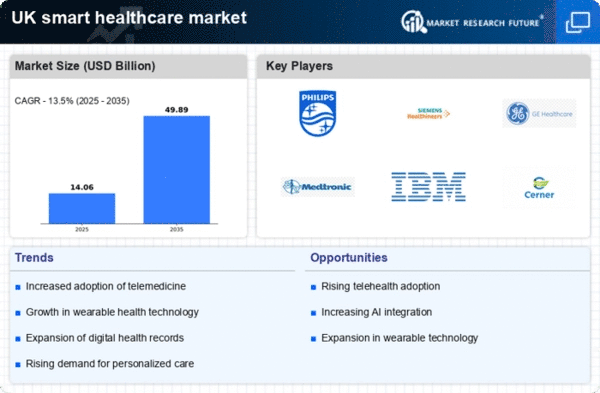Government Initiatives and Funding
Government initiatives and funding play a crucial role in propelling the smart healthcare market forward. In the UK, the government has recognized the importance of digital health technologies and has allocated substantial resources to support their development and implementation. For instance, the NHS Long Term Plan outlines a commitment to invest £4.5 billion in digital health solutions over the next few years. This funding is aimed at enhancing patient care through innovative technologies, such as telehealth and electronic health records. Such initiatives not only foster innovation but also encourage collaboration between public and private sectors, thereby accelerating the adoption of smart healthcare market solutions across the country.
Rising Demand for Remote Monitoring
The increasing demand for remote monitoring solutions is a key driver in the smart healthcare market. Patients and healthcare providers are seeking ways to manage chronic conditions without frequent hospital visits. This trend is particularly evident in the UK, where the prevalence of chronic diseases is on the rise. According to recent data, approximately 15 million people in the UK live with a chronic condition, which necessitates ongoing monitoring. Smart healthcare market solutions, such as wearable devices and mobile health applications, facilitate real-time data collection and analysis, enabling healthcare professionals to make informed decisions. This shift towards remote monitoring not only enhances patient engagement but also reduces healthcare costs, making it a pivotal factor in the growth of the smart healthcare market.
Growing Focus on Patient-Centric Care
The growing focus on patient-centric care is reshaping the landscape of the smart healthcare market. Healthcare providers in the UK are increasingly prioritizing patient experiences and outcomes, leading to the adoption of technologies that empower patients. This shift is evident in the rise of mobile health applications that allow patients to access their health information, schedule appointments, and communicate with healthcare professionals. Research indicates that patient engagement can lead to a 30% increase in treatment adherence, which is vital for effective healthcare delivery. By fostering a more collaborative relationship between patients and providers, the emphasis on patient-centric care is driving innovation and growth within the smart healthcare market.
Integration of Advanced Data Analytics
The integration of advanced data analytics into healthcare systems is transforming the smart healthcare market. By leveraging big data, healthcare providers can gain insights into patient outcomes, treatment efficacy, and operational efficiency. In the UK, the National Health Service (NHS) has been investing in data analytics to improve service delivery and patient care. Reports indicate that the NHS aims to harness data to enhance decision-making processes, potentially leading to a 20% improvement in patient outcomes. This analytical approach allows for personalized treatment plans and proactive healthcare management, which are essential in addressing the diverse needs of the population. Consequently, the emphasis on data-driven decision-making is a significant driver of growth in the smart healthcare market.
Technological Advancements in Medical Devices
Technological advancements in medical devices are significantly influencing the smart healthcare market. Innovations such as Internet of Things (IoT) connectivity, artificial intelligence, and machine learning are enhancing the functionality of medical devices. In the UK, the adoption of smart medical devices is on the rise, with a projected market growth of 25% over the next five years. These devices enable continuous monitoring and data collection, which are essential for timely interventions and improved patient outcomes. Furthermore, the integration of AI in medical devices allows for more accurate diagnostics and personalized treatment plans. As technology continues to evolve, it is likely to drive further advancements in the smart healthcare market.
















